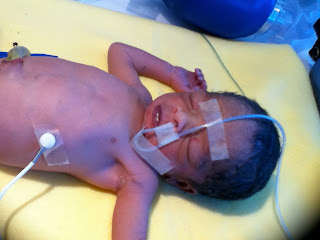There was an 18 year old girl on the ward who was expecting her second child, and she seemed to be very anxious and distressed. In Kelowna, we do what's called 1:1 nursing. That means that each patient has one nurse in the room with them at all times. At Lewanika, they simply don't have the staffing or resources to support 1:1 care. However, as students, Melissa and I were able to spend extra time with this girl and offer the extra support she seemed to need. We comforted her, held her hand, gave her cool cloths, and taught her different visualization and positioning techniques to help ease the pain of labour. As frustrating as it can be not having drugs and equipment at our disposal the way we do at home, it has been great experience having to always be thinking "what can I do with what I have?". After a couple hours, the girl was ready to deliver. Having assisted with a number of deliveries both in Zambia and Kelowna, I really wanted to deliver a baby on my own. I had the midwife talk me through everything, and soon enough, I delivered a healthy baby girl! I was so excited, overwhelmed, and happy. I held the baby up for mom, who was so excited to have a little girl. It was a very special experience for me.
The next day was very difficult for both of us- we came onto the ward for rounds with Dr. Finkleman- an excellent paediatrician from Kelowna, and saw that there were two new deliveries from the previous night and early morning. One little boy was born with an Apgar score of 1 (apgars are used to rate how well baby is adjusting to extrauterine life on a scale of 0-10. A score 7 and above means the baby is doing well, and anything below 5 means the baby is not transitioning well). He had to be resuscitated for about 20 minutes after birth, and clearly had neurological damage and was not doing well. The other baby was a little girl who was premature and weighed about 1kg, but was currently stable. We were closely monitoring the little boy, and ended up having to resuscitate him a couple of times that morning. We only had one working suction machine, and one machine for oxygen- nothing else worked. As we were performing CPR on the boy, our instructor Fay showed up, looked at the other premature girl baby, and saw that she wasn't breathing. We managed to stabilize the little boy, and had already started to resuscitate the little girl. We were quite literally going back and fourth between babies trying to keep them alive. Once the boy was stable, we moved him to the postpartum ward, hoping there would be more working equipment. It turned out that nothing there worked (TIA!) and we had to make due with what we had. We would have felt a lot better about everything if it wasn't a matter of life and death. After going back and fourth between wards and babies, it became clear that we were going to lose the little boy. The other nurses and doctors were busy having to go see different patients on other wards, and the babies were left alone. Melissa and I stayed with the boy and held him until he passed away. It was very sad, but we all did everything we could with what we had. Meanwhile, our little girl was still holding on. She is so, so small, but it looks like she'll make it! Later on after an emotionally exhausting morning, we had another mom in labour on the ward. Melissa really wanted to deliver a baby as well, and we both helped this lady through a difficult labour. Soon enough, we saw the head, and Melissa delivered another healthy baby girl! Each of us delivered the only girls we saw this week, and it was so special for us to see the new moms so excited about having girls. After the other deliveries we saw (all boys), the moms didn't seem excited or interested in their newborns until much later, after they had rested and had time to recover. After the babies are born, we weigh them, do a newborn assessment to make sure they're healthy, then wrap them in blankets that the moms bring from home. Everyone has brought HUGE duvets to wrap their babies in- I couldn't even wrap both my arms around their enormous bundles of joy. It's pretty funny. All in all, we had an amazing experience on maternity. Next week we're working at the Limulinga health clinic and teaching at a primary school and orphanage.
Steph and Melissa
Our tiny little girl, getting oxygen with our improvised nasal prong.
Melissa and the little girl she delivered
The healthy baby girl I delivered




No comments:
Post a Comment